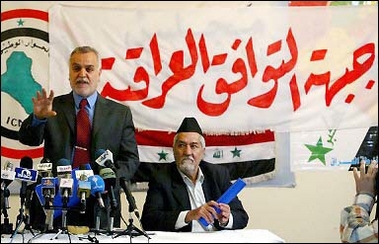|
Sunni Arabs join forces for Iraq elections
(AP)
Updated: 2005-10-27 08:59
Three Sunni Arab groups joined forces Wednesday to field candidates in
December's elections provided for under the newly ratified constitution which
many Sunnis opposed.
But a group of hard-line Sunni clerics denounced the constitution and said
they will not join the political process.
Those contradictory statements signaled confusion within the minority Sunni
Arab community, which forms the core of the insurgency, over how to go forward
after it failed to block ratification of the new constitution in the Oct. 15
referendum.
Leaders of the three Sunni groups — the General Conference for the People of
Iraq, the Iraqi Islamic Party and the Iraqi National Dialogue — announced they
would field a joint slate of candidates in the Dec. 15 balloting and work
together in the new parliament to promote Sunni interests.
"This alliance aims to provide Iraqis with a national slate for the
elections," Ayad al-Samarraie, a senior official of the Iraqi Islamic Party,
told reporters.

Tarek al-Hashimi (L), Secretary General of
Sunni Muslim Iraqi Islamic Party, and Adnan al-Duliami, head of the
General Conference for Sunnis in Iraq, announce in Baghdad the formation
of a new alliance to run on one list in December 15 parliamentary election
under the name Iraqi Concord Front. [AFP] | He
said the largely Sunni alliance will include some Shiites in southern provinces
and that its agenda will include a call for the withdrawal of U.S.-led forces
from Iraqi — if progress can be made in building national institutions.
"The next elections are important because they will produce a balanced
National Assembly," he said. "Iraqis will have various options to choose from,
and this enriches democracy in Iraq."
U.S. officials see Sunni Arab participation as a hopeful sign that more and
more members of the community will forsake the insurgency, enabling the United
States and its allies to begin drawing down their forces next year.
Sunni Arabs largely boycotted the Jan. 30 election,
enabling the Shiites and Kurds to win an overwhelming majority in parliament and
shape the constitution. Many Sunni Arabs voted against the charter in October
because they feared it could lead to the breakup of the country and favored
rival Shiites and Kurds.
|